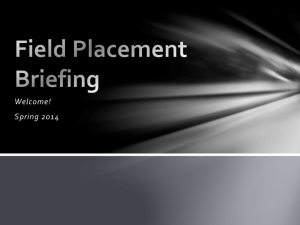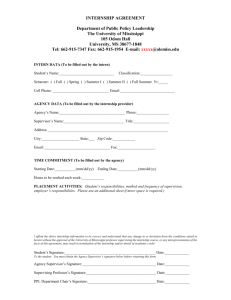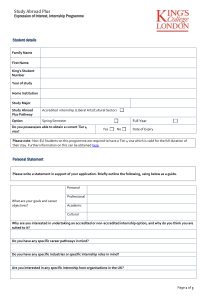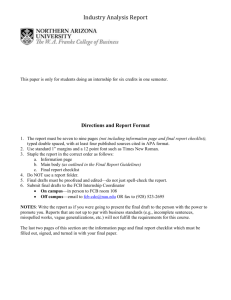INCM 9700 – International Experience Guidelines and Forms
advertisement
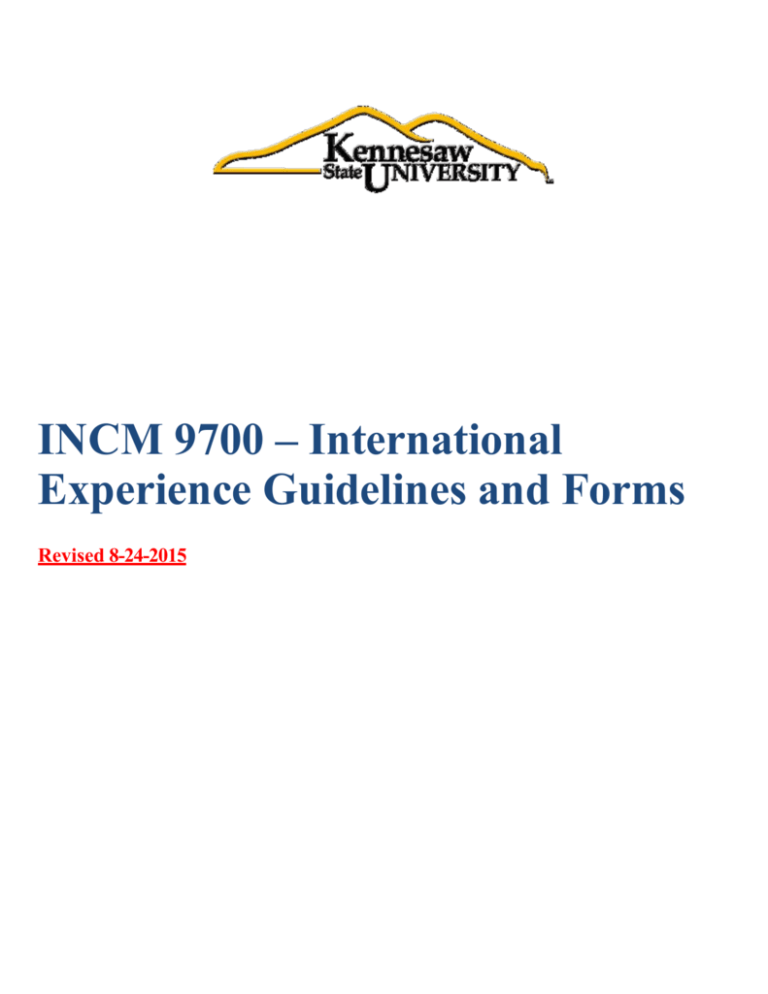
INCM 9700 – International Experience Guidelines and Forms Revised 8-24-2015 International Experience DRAFT May 25, 2011 Requirements and Guidelines Every student will be required to undertake an international experience as part of the program as a way for the student to apply the theories and skills learned throughout the program as well as to gain valuable field experience that provides a “real world” laboratory for informing course work. The international experience may be an internship or another opportunity for research or study in an international setting; students can enroll for international experience credit upon the completion of the first year of coursework. In addition to an experience-specific deliverable, all students will complete a 4-6 page (double spaced) reflection paper that links theory to practice in the context of student’s experience. General Expectations Students will devote at least 150 hours to the international experience project (3 credit hours). Each project should have an experiential, hands-on component, which may entail a traditional internship, involvement in a research project, a series of interviews, participation in meetings related to the project, working with stakeholders to craft a conflict analysis or develop a case study, etc. For those who complete a traditional internship, their deliverable is the substantive project agreed on in advance between the site supervisor and student and approved by the international experience coordinator. For those studying a semester in another institution, their deliverable is satisfactory completion of the coursework. For those satisfying the requirement through a previous international experience, the deliverable will vary and will depend on what was agreed on with the international experience coordinator, in consultation with the program director, in advance. All final projects, however, should include selfreflective dialogue regarding the intersection between theory and practice as experienced in the field, and may involve a public presentation of the experience, research, or findings to a broader audience. Students have a wide range of options for completing this experiential project, which bridges the realms of theory and practice. Regardless of the option selected—internship, study abroad, research project, or academic project based on prior substantive, related experience—students should engage in reflective practice and reflect on the ways in which theory informs practice and practice informs theory. Prior to embarking on any international experience, students must complete the appropriate forms and reach agreement on project requirements with the international experience coordinator, in consultation with the program director. If the student’s project involves research or other field work involving human subjects, students must complete the International Review Board certification self-tests available at http://www.citiprogram.org/. Students must print out the certificate of completion and provide a copy to the international experience coordinator prior to beginning the project. Students must also obtain IRB approval. Requirements for Reflective Paper: All students, regardless of option chosen for fulfilling the International Experience requirement, must write a 4-6 page (doublespaced) paper that critically reflects on how course theories and concepts learned in the classroom operated in the real world setting of the international experience. This piece should be reflective and analytical rather than merely descriptive, and should provide substantive, concrete examples of how the theories and concepts did (or did not) play out in the field. Students are also encouraged to reflect on how their experiences might inform theory. This is not a formal research paper, but articles and readings used for sourcing concepts and theories should be referenced and included in a short bibliography at the end of the piece (not included in page length). This piece provides an opportunity as well for students to reflect on how this experience might inform their future study and/or post-graduation plans. Internship Contract (Form #1) Each student involved in an internship will draw up a contract with the site supervisor where he/she will be working, which will define the scope of the proposed work, the intended outcome (e.g., research report, publication, website, etc), the learning objectives, describe how it will serve the student’s post-graduation goals, and name a field supervisor for the experience. If the fieldwork involves surveys, interviews, etc. that require Human Subjects approval, that should be noted in the contract along with a time line for completion of the approval process. Both Human Subjects approval forms and Site Supervisor Contracts should be turned in to the international experience coordinator before beginning formal work on the project. Possible internship avenues (students apply and pursue on their own) There are many inter-governmental and non-governmental organizations working in areas relevant to international conflict management that provide paid and unpaid internships. While some agencies have established internship programs and set application procedures, others may be open to discussion on a self-crafted internship if you have a specific project or skills to offer. A few examples of possible institutions for internships include: -United Nations -Carter Center -CARE International -Refugee Resettlement Agency -KAIPTC -BICC -US Army War College Students should plan ahead as often internships are highly competitive and the application and clearance process for organizations like the UN in particular can be quite lengthy. Internships should be substantive and engaged with significant projects related to the course of study and future goals; students should not be making copies or running errands. Research Contract (Form #2) For students undertaking a research project the contract outlines the purpose and intended outcome of the research, how the research project will serve the student’s post-graduation goals, the methodology for the study, etc. Students should identify a research supervisor, who should sign off on the goals, methodology, and purpose of the research project. Students involved in a research project must make sure to comply with Institutional Review Board (IRB) standards and receive approval prior to undertaking any research with human subjects. Study Abroad/Exchange (Form #3) Kennesaw State University as a whole, and the International Conflict Management Program specifically, has a number of study abroad programs and international exchanges established with partner institutions around the globe. Students are encouraged to take advantage of these exchanges and study abroad options during the summer or for a full semester of study. This form should detail the courses the student intends to take while at the partner institution or foreign university and how they will contribute to the student’s academic and post-graduation goals. Students studying abroad for a full semester will receive 3 credits for the international experience and can transfer in up to 6 credits for content-related courses taken at the foreign institution for a total of nine credit hours. Internships and Exchanges Available through INCM Bonn International Center for Conversion (BICC), Bonn, Germany - http://www.bicc.de/ Kofi Annan International Peacekeeping Training Centre (KAIPTC), Accra, Ghana - http://www.kaiptc.org/ Scuola Superiore Sant’Anna, Pisa, Italy - http://www.sssup.it/ International Research Laboratory on Conflict, Development and Global Politics http://www.sssup.it/context.jsp?ID_LINK=9715&area=47 Stellenbosch University, Stellenbosch, South Africa - http://www.sun.ac.za/index.asp Department of Political Science - http://sun025.sun.ac.za/portal/page/portal/Arts/Departments/political_science Saldanha Military Academy - http://www.sun.ac.za/milscience/index.htm United States Army War College, Carlisle, PA - http://www.carlisle.army.mil/ Peacekeeping and Stability Operations Institute - http://pksoi.army.mil/ United Nations Interregional Crime and Justice Research Institute (UNICRI) - http://www.unicri.it/ University of Cape Cost, Cape Coast, Ghana - http://www.ucc.edu.gh/ Institute for Development Studies - http://ucc.edu.gh/academics/view/3/programme/3655 University of Ibadan, Ibadan, Nigeria – http://www.ui.edu.ng/ Centre for Peace and conflict Studies (CEPACS) - http://www.ui.edu.ng/cepacs Institute of African Studies - http://ui.edu.ng/africanstudies Institute for Peace Research and Security Policy, University of Hamburg, Germany http://www.ifsh.de/ifsh_english/profil/profil_start.htm Additional Partnerships under Development: American University of Iraq-Sulaimani Carter Center, Atlanta, GA, USA Program in Conflict Resolution; Lauder School of Government, Diplomacy and Strategy; Interdisciplinary Center (IDC), Herzliya, Israel Universidad de San Francisco, Quito, Ecuador Assignment based on Previous Experience (Form #4) In some instances, students will enter the program with significant prior international experience. In such cases, the student may petition the international experience coordinator, who will consult with the program director, for approval to count that experience as satisfying this program requirement. Students should submit a synopsis of the international experience and a proposal for an academic project to satisfy the international experience requirement. In compiling the proposal and synopsis, the student will complete form #4, which summarizes the project’s goals, its audience, its deliverables, how the project relates to the student’s specialization and conflict management as well as future goals. To be considered for approval, the international experience must have occurred within the previous 5 years, must have totaled at least 150 hours of international experience relevant to the field of international conflict management, and students must have completed a substantive project with international significance. Possible projects for those with prior experience The following list is meant to be illustrative of the types of academic projects that might be proposed based on previous international experience related to international conflict management. Students must get any projects approved in advance of their completion by completing the synopsis and proposal outlined in Form #4. All of these projects would be accompanied by the 3-5 page self-reflective piece examining the intersection of theory and practice as it relates to the particular project undertaken required by all. Academic paper that analyzes the international experience in depth, drawing on and applying themes and topics taken from INCM core classes. This paper should indicate in what ways your experience added to knowledge above and beyond what you learned from the conflict management literature. What did the experience add to or contradict from previous studies? The paper should also include any lessons learned, considerations for future research/study/career as well as any challenges (ethical, practical, intellectual) that you encountered and how you overcame them. Creation of a case study that could be used in the classroom by students or professionals studying particular conflict cases or international cases, including both teaching notes and student materials. Case is written up with questions for discussion and action; student also provides a short analysis and summary of how they responded to the case situation in their international experience. Curriculum materials developed that could be used for an NGO or student training in a particular set of skills or knowledge base emerging out of the international experience (e.g. curriculum on human rights, or gender and development, or cross-cultural communication). This would include developing handouts, activity notes and guidelines for those who would use the curriculum or conduct the training. Students should also provide a brief paper explaining how the curriculum/training contributes to an observed need (in the literature and/or through the student’s experience) and how it fills that need (audience, content, delivery format, etc). The student should also have a plan for distributing the curriculum/training materials to identified organizations. Thorough conflict assessment or conflict analysis of the area of the internship/experience in the model of conflict assessments done for international NGOs and aid agencies. This should build onto the literature and not repeat existing assessments. Reflective Practice Paper published on www.beyondintractibility.org or other suitable public venue. PhD in International Conflict Management Kennesaw State University Field Placement/Internship Form (#1) (To be completed by the student after meeting with the field supervisor and before beginning the placement.) Student’s Name: Phone #: Email address: Field Placement Agency/Organization: Field Supervisor: Phone: Email: Identify the roles and responsibilities you will have during your internship. List your objectives for this placement How will you obtain your objectives? (Include a description of any special project that you will be working on during the placement.) How does this Field Placement relate to your academic and post-graduation goals? Does this internship require IRB approval? If so, has it been received? To be signed after review with the International Experience Coordinator ____________________________________________________________ International Experience Coordinator Date _____________________________________________________________ Student Date PhD in International Conflict Management Kennesaw State University Internship Contract (Form #1) To be completed by the Field Supervisor Student’s name: Phone #: Email: Agency/Organization: Address: Phone: Fax: The following individual has consented to supervise the student named above in a field placement for ………………………….. Anticipated total number of hours on site per week/per month will be ……….. Field Supervisor: Name: Title: Phone: Email: The student’s responsibilities will include, but not be limited, to the following: ……………………………………………………………………………………………… ……………………………………………………………………………………………… ……………………………………………………………………………………………… ……………………………………………………………………………………………… ……………………………………………………………………………………………… Signatures: _________________________________________________ Field Supervisor Date: _________________________________________________ Student Date: __________________________________________________ International Experience Coordinator Date: PhD in International Conflict Management Kennesaw State University Field Research Contract Form (#2) Student’s name: Phone #: Email address: The following is to be completed by the student (Please attach additional sheets as necessary): What is the purpose of your field research? What issue/s of conflict management are you investigating? What is your methodology? How will you operationalize this methodology in your research project? How does this research project further your academic and post-graduation goals? As the international experience is designed to be experiential, how will you experience, observe, and practice conflict management within this research project? G) You are expected to devote a total of 150 hours to the Field Study and the Fieldwork Analysis Project and Report. How will you plan your time? H) Does your project require IRB approval? If yes, have you received it? Signatures: _______________________________________________ Student Date Research Supervisor Date _______________________________________________ International Experience coordinator Date PhD in International Conflict Management Kennesaw State University Study Abroad/Exchange Form (#3) Student’s Name: Phone #: Email address: Partner Institution/University: Field Supervisor/Exchange Coordinator: Phone: Email: List your objectives for this study abroad/exchange Identify the courses you intend to take, the level at which they are offered (MA or PhD), and the number of credit hours for each (if relevant) OR outline the scope of the proposed project you will be working on as well as the intended outcomes How will these courses/this project contribute to your academic and post-graduation goals? To be signed after review with the International Experience Coordinator ____________________________________________________________ International Experience Coordinator Date _____________________________________________________________ Student Date PhD in International Conflict Management Kennesaw State University Exchange Contract (Form #3) To be completed by the Field Supervisor Student’s name: Phone #: Email: Agency/Organization: Address: Phone: Fax: The following individual has consented to supervise the student named above in a field placement for ………………………….. Anticipated total number of hours on site per week/per month will be ……….. Field Supervisor/Exchange Coordinator: Name: Title: Phone: Email: The student’s responsibilities will include, but not be limited, to the following: ……………………………………………………………………………………………… ……………………………………………………………………………………………… ……………………………………………………………………………………………… ……………………………………………………………………………………………… ……………………………………………………………………………………………… Signatures: _________________________________________________ Field Supervisor/Ex. Coord. Date: _________________________________________________ Student Date: __________________________________________________ International Experience Coordinator Date: PhD in International Conflict Management Kennesaw State University Previous Experience Form (#4) Student’s Name: Phone #: Email address: Provide a brief synopsis of your international experience (be sure to include date, location, and time period covered) Provide an outline of your proposed academic project that addresses the following questions: -What is the intended outcome of the project? -What will be the format of your academic project (and approximate scope, length, etc) -Who is the intended audience? -What are the learning objectives related to international conflict management? How does the project relate to your academic and post-graduation goals? To be signed after review with the International Experience Coordinator ____________________________________________________________ International Experience Coordinator Date _____________________________________________________________ Student Date Reflection Paper for International Experience: Directions and Grading Rubric All students, regardless of option chosen for fulfilling the International Experience requirement, must write a 4-6 page (doublespaced) paper that critically reflects on how course theories and concepts learned in the classroom operated in the real world setting of the international experience. This piece should be reflective and analytical rather than merely descriptive, and should provide substantive, concrete examples of how the theories and concepts did (or did not) play out in the field. Students are also encouraged to reflect on how their experiences might inform theory. This is not a formal research paper, but articles and readings used for sourcing concepts and theories should be referenced and included in a short bibliography at the end of the piece (not included in page length). This piece provides an opportunity as well for students to reflect on how this experience might inform their future study and/or post-graduation plans. The reflective essay (along with any other specified deliverables) should be submitted one week before the last day of classes for the semester in which the student is enrolled. Student Learning Objectives: 1 Students should demonstrate the ability to link theory and practice by applying theories learned during the International Conflict Management program to the student’s international experience (for example, how does theory help explain or predict what you experienced in the field?) 2. Students should demonstrate their ability to be a reflective scholar-practitioner by critically considering the implications of their observations and experiences for theory and/or practice of international conflict management. This might include discussing observed strengths and weaknesses of theories in the context of their international experience, drawing lessons from their experience that might be used to support, modify or advance theory, exploring possibilities of future research that might give additional insight into a particular puzzle or dilemma. 3. Students should draw connections between their international experience and future career or educational objectives and/or plans. This can include discussion of how the experience specifically furthers a student’s progress toward a particular goal or it might involve a discussion of what a student discovered regarding what they do not want to do in the future (and why). Explicit links should be made between concrete experiences and precise goals/objectives, using illustrations and examples from the international experience. 4. Students should demonstrate their ability to convey experiences, ideas, and reflections clearly in writing. Objective Application of theory to practice (30%) Reflective Analysis of strengths and weaknesses of theory based on experience (30%) Honors (90-100) Competent (80-89) Clearly integrates and applies relevant theories to the experience in a consistent, accurate manner Draws lessons from theory for the practice/experience. Provides clear, compelling examples to illustrate. Applies theory but may not select the best theory OR Selects relevant theory but does not apply it systematically, may make minor errors in application. Uses examples, but they may be limited in depth or clarity Provides some evaluation of theory in connection to the international experience; may not always be consistent or Demonstrates critical thinking in examining strengths and weaknesses of theories; explores limitations of theory in explaining what student observed in the field. May contribute new insight Needs Improvement (70-79) Minimal application of relevant theory or application of theory that is a poor fit. Limited or sporadic examples or examples may not be linked back to the experience Unsatisfactory (60-69) Absent (059) May mention theory but does not systematically apply it, errors in applying theory indicate lack of understanding. Examples may be difficult to understand in terms of the points made No application of theory Makes only general references to theory, limited evaluation of strengths and/or weaknesses. Unclear or tenuous Lack of connection between strengths and weaknesses of theory and the experience or minimal evaluation of theory. No evaluation of theory’s strengths and/or weaknesses Score Ability to make linkages between educational/care er goals and international experience (20%) Quality and clarity of writing (10%) Meets basic assignment requirements (10%) into theory. Provides clear, compelling examples to illustrate complete in evaluation. Uses examples, but they may be limited in depth or clarity Draws clear lessons from the experience to be used in assessing future learning and career options; indicates how this experience fits with future goals. Provides clear, compelling examples to illustrate Some discussion of the connection between experience and learning/career objectives but connection not fleshed out thoroughly. Examples may be limited in depth or clarity Reader never has to ask 'What does the author mean here?' Writing is fluid and concise. Spelling and grammar is 100% correct. Word choice and terminology is 99% correct. Reader rarely has to ask 'What does the author mean here?' Terminology is used correctly. Only minor errors in spelling, word choice, or grammar. Paper meets the 4-6 page requirement and is submitted before the deadline (1 wk before last day of classes) Paper may be slightly short or slightly long or is submitted 1 day after the deadline connection between the evaluation of theory and the experience. Limited or sporadic examples or examples may not be linked back to the experience May mention future career/learning objectives but not connected back to the experience or reflects on strengths of experience without talking about career/learning goals. Limited or sporadic examples or examples may not be linked back to the experience Author's ideas sometimes only understandable with difficulty, requiring repeated rereadings of some sentences or sections. Lack of clarity may be due to errors in grammar, word choice, or spelling. Paper may be slightly short or slightly long and submitted 1 day after the deadline OR submitted 2 days after the deadline Examples may be difficult to understand in terms of the points made Only passing reference to learning outcomes of the experience. Examples may be difficult to understand in terms of the points made No discussion of career and/or learning goals Many ideas initially unclear, or multiple errors in spelling, word choice, or terminology. Some ideas may remain unclear even after repeated readings. Writing requires extensive interpretation; main ideas unclear even after multiple readings. Paper is more than 1 page off length or submitted 3 days after the deadline Paper is more than 2 pages off or submitted over 3 days after the deadline Total Score: College of Humanities and Social Sciences PhD in International Conflict Management International Experience Information Student Name: Supervisor: Institution/Project Site: Project Title: Type of International Experience: Prior International Experience: Research Internship Study Abroad International Experience Project Description PhD students should complete this to parallel what is written on the approved international experience form. Purpose: Objectives: Tasks: Output/Deliverables: Rating Scale Evaluation of Student Responsibilities and Performance Excellent Above Average Average Below Average Poor N/A Understanding of goals and objectives Achievement of goals and objectives Performance of Tasks Quality of Output/Deliverables Research Experience (for research focused projects) Excellent Above Average Average Below Average Poor N/A Excellent Above Average Average Below Average Poor N/A Research Skills Ability to conduct research independently Ability to evaluate evidence and work with data Ability to contribute substantively to final product Overall Skills Demonstrates a commitment to considering alternative viewpoints Attempts to maintain cooperative and professional working relationships Demonstrates initiative/flexibility Meets deadlines Responds constructively to feedback and criticism Responds appropriately to internal and/or external request for assistance Assumes responsibility and accountability for own work Grade Exceeds Expectations A Meets Expectations B Needs Improvement C Failing F Please identify any areas that merit improvement and recommend ways in which better skills can be utilized. Please provide a brief (1-2 paragraph) narrative account of your overall assessment of the student’s performance, including and situational factors that may have adversely affected the student. Signature Date Email address Phone Please return to the International Experience Coordinator, Dr. Joseph Bock at jbock2@kennesaw.edu, 365 Cobb Avenue NW, Maildrop 1602, Kennesaw, GA 30144, USA.
